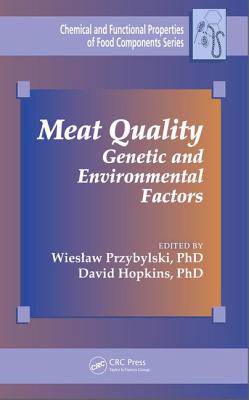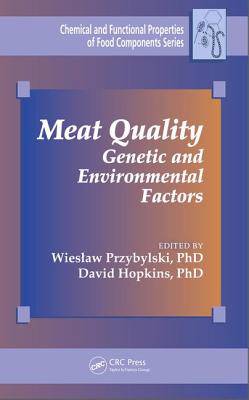
- Retrait gratuit dans votre magasin Club
- 7.000.000 titres dans notre catalogue
- Payer en toute sécurité
- Toujours un magasin près de chez vous
- Retrait gratuit dans votre magasin Club
- 7.000.0000 titres dans notre catalogue
- Payer en toute sécurité
- Toujours un magasin près de chez vous
Description
One of the biggest challenges faced by meat producers today is the requirement to improve the quality of meat while maintaining focus on efficiency and higher yields. Numerous studies have shown that consumers are willing to pay premiums for meat products with guaranteed eating quality. This book examines the complicated multistep process of producing high-quality meat, from the growth of the animals to the final product. It discusses specific aspects of meat quality for beef, pork, and sheep.
Meat Quality: Genetic and Environmental Factors covers key topics such as animal welfare, nutrition, pre-slaughter handling, slaughter technology, breeding strategies, and the influence of common genetic factors on meat quality. It also discusses the latest meat production systems designed to ensure high-quality meat and the role of transgenic animal technology in meat quality. The book devotes separate chapters to beef, pork, and sheep quality, looking at the effects of breed, genetic type, gender, and age on meat quality.
The chapters are written by contributors from universities, research institutes, and breeding companies from different countries and continents. The chapters are based on the research and teaching experience of the contributors as well as on a critical evaluation of the current literature.
No other book available today covers the key issues regarding meat quality in such a comprehensive way. This book should be of keen interest to students of food technology, nutrition, commodities sciences, and animal sciences, as well as to food scientists and engineers who want to update their knowledge about the determinants of meat quality.
Spécifications
Parties prenantes
- Auteur(s) :
- Editeur:
Contenu
- Nombre de pages :
- 472
- Langue:
- Anglais
- Collection :
Caractéristiques
- EAN:
- 9781482220315
- Date de parution :
- 19-10-15
- Format:
- Livre relié
- Format numérique:
- Genaaid
- Dimensions :
- 157 mm x 234 mm
- Poids :
- 861 g

Les avis
Nous publions uniquement les avis qui respectent les conditions requises. Consultez nos conditions pour les avis.






